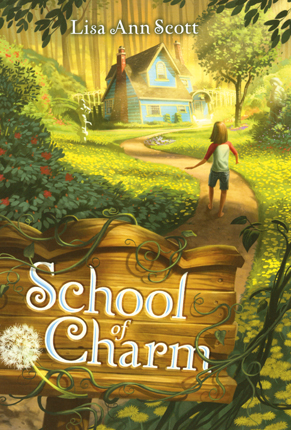Full Text Reviews: Bulletin for the Center... - 02/01/2014 It’s 1977, and eleven-year-old Brenda “Chip” Anderson is not one bit thrilled with her new Southern surroundings at the house of her estranged grandmother in North Carolina. Unlike her older and younger sister, nature-loving tomboy Chip can’t seem to fit into a life dominated by her grandmother’s heavy-handed machinations to prepare the girls for the local beauty pageant. The girls’ newly widowed mother isn’t much help, and the grandmother’s persistent unkindness towards Chip goes largely unchecked. Desperate for some positive attention, Chip stumbles upon the nearby home of a woman who runs a unique charm school. Miss Vernie treats Chip kindly and, with the help of what Chip believes are magic charm bracelets, trains Chip and two other girls—plump, insecure Karen and fierce, African-American Dana—for the pageant in her own unorthodox way. Chip veers between trying to make herself into something she’s not and being herself as the pageant approaches and, as she discovers some secrets about her grandmother’s past, she learns that people are more complicated than they seem. Chip is a likable heroine, and the period setting is cozy but still realistic (there is resistance to Dana taking part in what has traditionally been a white pageant, setting up the 1983 conclusion in which Vanessa Williams is crowned Miss America). The family dynamics are engaging but overdrawn: Chip’s grandmother is so nasty to her for so much of the book that her change of heart near the end, while a relief, is hard to swallow. Chip’s willingness to participate in a pageant may be equally unbelievable, but her sorrow at the loss of her father is entirely credible. Despite the book’s shortcomings, readers who like heart-warming family stories, spunky heroines, and Southern settings may still find this an entertaining read. JH - Copyright 2014 The Board of Trustees of the University of Illinois. Booklist - 02/01/2014 Chip and her two sisters have never met their emotionally distant grandmother, but following their father’s death, Mama moves the family back into her childhood home. While Grandma is fixated on preparing the girls for the Miss Dogwood pageant, nature-loving tomboy Chip balks at the idea. Ironically, she finds a haven in the nearby School of Charm, where kind, supportive Miss Vernie takes the 11-year-old under her wing. As Chip gets to know the two other students and joins in their nontraditional training for the beauty pageant, she comes to understand herself better. Chip’s subtle transformation leaves her wondering whether the word charm in the school’s name might have more to do with magic than with beauty. While this chapter book includes cultural references specific to its setting, North Carolina in 1977, it deals with universal themes such as emotional isolation, intergenerational conflict, self-knowledge, and grief. Simply written and engaging, the narrative gathers steam as it travels along to its satisfying conclusion. - Copyright 2014 Booklist. School Library Journal - 02/01/2014 Gr 4–6—After her father's death, Chip, her sisters, and their mother move from New York to North Carolina to live with their grandmother. Chip, a tomboy, enjoys being outside, getting close to nature, and is unafraid of getting dirty. The transition to life in North Carolina is made more difficult by Grandma's expectations, her formal home filled with taxidermy, and an apparent dislike of the protagonist. Grandma, who was crowned Miss North Carolina 1939, would like to continue the beauty pageant tradition, a notion embraced by Chip's sisters. Family relationships are further compounded by an unwillingness to talk about the shared loss of their much-loved father. During one of Chip's outdoor explorations she discovers Miss Vernie's School of Charm. At this unique, almost enchanted charm school, "free to those who need it," the narrator meets two girls, Dana and Karen. Like Chip, they are unhappy but reluctant to share their feelings. Everyone, it seems, has a secret. Told in the first person, Chip's voice is generally authentic, though she grasps adult insights a bit too readily. References to the 1970s provide a pre-Internet era in which the characters develop and grow. Though the conclusion is a bit pat, the process of grieving and change is handled realistically in this satisfying novel.—Maria B. Salvadore, formerly at District of Columbia Public Library - Copyright 2014 Publishers Weekly, Library Journal and/or School Library Journal used with permission. Loading...
|



